

What could happen in China in 2015? It seemed harder to prepare my “look ahead” this year.
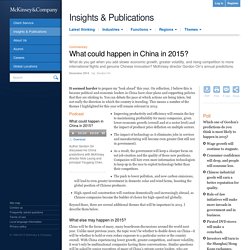
On reflection, I believe this is because political and economic leaders in China have clear plans and supporting policies that they are sticking to. What could happen in China in 2015? The Urbanization of the Chinese Working Class. China has problems.
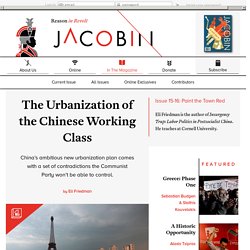
Not despite thirty-five years of record-breaking growth, but because of it. The country’s dependence on exports and investment-led development has resulted in stark inequality, underconsumption, over-investment, disappearing arable land, exorbitant housing prices, and a looming environmental catastrophe. This leaves China increasingly vulnerable to a number of potential crises: external economic shocks, housing market collapse, mass defaults on public debt, and fits of social unrest.
Confucius institute: The hard side of China's soft power. 21 December 2014Last updated at 19:19 ET By John Sudworth BBC News, Shanghai Confucius Institutes organise cultural events and classes in 123 countries Xu Lin is an unusual kind of Chinese official.
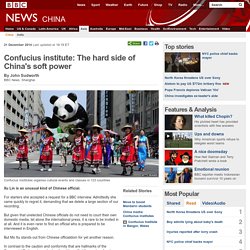
For starters she accepted a request for a BBC interview. Admittedly she came quickly to regret it, demanding that we delete a large section of our recording. But given that unelected Chinese officials do not need to court their own domestic media, let alone the international press, it is rare to be invited in at all. China’s digital transformation. As individual companies adopt web technologies, they gain the ability to streamline everything from product development and supply-chain management to sales, marketing, and customer interactions.
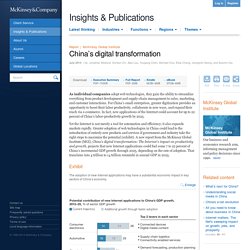
For China’s small enterprises, greater digitization provides an opportunity to boost their labor productivity, collaborate in new ways, and expand their reach via e-commerce. In fact, new applications of the Internet could account for up to 22 percent of China’s labor-productivity growth by 2025. Yet the Internet is not merely a tool for automation and efficiency; it also expands markets rapidly. Greater adoption of web technologies in China could lead to the introduction of entirely new products and services if government and industry take the right steps to maximize the potential (exhibit). Exhibit. US–China agreement presages a change in the air. Author: Frank Jotzo, ANU The joint Chinese–American announcement of emissions targets brings the world a big step closer to meaningful post-2020 action on climate change.
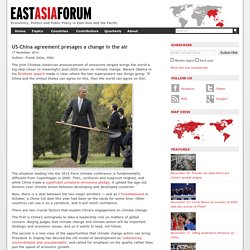
Barack Obama in his Brisbane speech made it clear where the two superpowers see things going: ‘If China and the United States can agree on this, then the world can agree on this’. The situation leading into the 2015 Paris climate conference is fundamentally different from Copenhagen in 2009. Then, confusion and suspicion reigned, and while China made a significant unilateral emissions pledge, it upheld the age-old division over climate action between developing and developed countries. 24 June 2014: China’s protection of its overseas interests is becoming increasingly complex. The evacuation of Chinese citizens from Viet Nam in May 2014 and a possible new evacuation from Iraq in the next few days are just two recent examples which demonstrate that, for China, protecting its overseas interests is becoming an increasingly complex challenge.
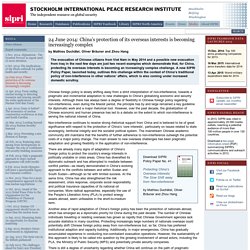
A new SIPRI Policy Paper, launched today, outlines this challenge within the context of China’s traditional policy of non-interference in other nations’ affairs, which is also coming under increased domestic scrutiny. Chinese foreign policy is slowly shifting away from a strict interpretation of non-interference, towards a pragmatic and incremental adaptation to new challenges to China’s globalizing economic and security interests.
Although there has always been a degree of flexibility in Chinese foreign policy regarding non-interference, even during the Maoist period, the principle has by and large remained a key guideline for diplomatic work and a major rhetorical tool. Alternative Images of China in 2035: A Case Study of Tamkang University Workshops. China withholds full domestic-security spending figure. Semiconductors in China: Brave new world or same old story? Executives of global semiconductor companies have had their eyes on China for many years, primarily as a customer-rich end market and a source of innovation.
But now they will need to take an even closer look. Government stakeholders in China have been reconsidering the risk posed by the country’s heavy reliance on others for semiconductor components and capabilities, and they are carrying out policy changes that could correct for this dependence. Pair these policy efforts with private-market forces that are slowly but surely strengthening the capabilities of mainland semiconductor companies and multinational chip makers competing in China will likely face a very different operating environment—one with new risks and opportunities.
CHINA'S FUTURE. WITHIN Asia, it is Chinese activity, not Chinese inactivity, that has people worried, and their concern is understandable.
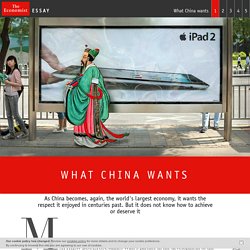
Perhaps most provocative is China’s devotion to the “nine-dash line”, an ill-defined swish of the pen around the South China Sea. Within this perimeter, China claims all the dry land and, it appears, all the water and seabed too; by way of contrast, the rules of the United Nations Convention on the Law of the Sea (UNCLOS) would tend to see quite a lot of those things as subject to claims from other countries. Speaking in June at the Shangri-La Dialogue, an annual regional-security shindig in Singapore, Wang Guanzhong, a Chinese general, made it clear that although China respected UNCLOS, the convention could not apply retroactively: the nine-dash line was instituted in the 1940s and the islands of the South China Sea have been Chinese for 2,000 years.
Others in China have been blunter. Probably not all that much, for now. Militarily, this is indeed the case. Video. Corruption: No ordinary Zhou. To Chinese Corruption. The Communist Party Politburo is the de facto power center of China.

Its members -- currently 23 men and two women -- make the policies that directly affect 1.3 billion Chinese citizens, and, indirectly, hundreds of millions more around the world. Decoding China’s Emerging “Great Power” Strategy in Asia. China Thinks Hillary Is Bossy. Hillary Clinton's unstated but near-inevitable campaign for the 2016 presidency is ramping up with the June 10 release of Hard Choices, her memoir of her time as secretary of state, and the (soon-to-be) countless corresponding press interviews.

The book will hopefully help broaden the conversation from Benghazi -- the Libyan city where gunmen killed a U.S. ambassador and three other Americans in Sept. 2012 -- to a broader reckoning of her four-year tenure at the State Department, and from her past record to her future policies. Clinton's complicated dance with China, for example, is a far more important guide to U.S. policy than what she did or did not know about embassy security in Libya. Xi Jinping's Bad Dream.
It's not a question if the Thai coup will go wrong; it's a question of when, and how badly. You might think the Royal Thai Army would be good at quelling unrest by now -- Thailand has been in permanent political crisis since the 2005 protests against then Prime Minister Thaksin Shinawatra, and politically unstable for most of the 20th century. But like the last coup in September 2006, the military's May 22 seizure of power in a bloodless coup will be disastrous.
At the core of Thailand's problems is a huge gulf between supporters of Thaksin -- who was ousted in the 2006 coup and whose sister Yingluck was prime minister from 2011 until May -- and those who vigorously oppose the Shinawatra clan. Beijing tense on Tiananmen massacre anniversary. 4 June 2014Last updated at 09:43 ET Carrie Gracie has been back to Beijing to find out what young people think today Chinese security personnel have swamped Beijing's Tiananmen Square on the 25th anniversary of the Beijing massacre.
Foreign journalists were ushered away from the square and passers-by were searched and had their papers checked. Remembering Tiananmen: The lessons of history. EVEN after the Chinese army moved into Tiananmen Square on the night of June 3rd 1989, and cleared it of the detritus left by the students who had occupied it for most of the previous seven weeks, it was several days before observers were certain who was in control of China. Your correspondent, looking down Beijing’s central boulevard, Chang’an Avenue, at a maze of still-burning barricades a day after the bloody operation, was not alone in wondering whether the Communist Party could ever heal.
This newspaper, with which he was not then linked, summed up a common view: “This week China looked into the abyss of coup, counter-coup and civil war”. Foreign doomsayers were proved wrong. But even after 25 years of relative stability, it is still wise to be cautious about the cohesion of Chinese politics. It was not just foreign observers who were given to apocalyptic musings at the time.
‘We welcome Chinese investment, including from SOEs’ Guy Saint-Jacques, Canada’s ambassador to China, gave the keynote speech at the 4thNational Forum on Chinese Investment in Canada organized by the University of Alberta’s China Institute on May 2 in Calgary. The following is an excerpt from his talk from a China Institute recording of the event transcribed by Embassy reporter Shahed Al-asadi.
It has been edited for style and length. The experience so far First, it’s pretty difficult to measure exactly the amount of Chinese investment in Canada. I will give you a few numbers on this. If you go on [the] Statistics Canada website, you will learn that this investment totals about $13 billion, which is very far from the reality. We have looked at information available in open sources and we have come to a figure that is closer to $38 billion, which is about the same figure that the Heritage Foundation Investment Tracker has come up with.
So, $38 billion...and in Australia it was just over $59 billion. According to Mr. As Mrs. Cracks form in bedrock of China’s economy as house prices slip. Nearly 300 kilometres north of Hong Kong, a coastal city is at the forefront of a worrisome new trend for China: falling house prices. In May, new home prices in 62 Chinese cities edged downward from the month before, dragging down the Chinese average for the first time in nearly two years. The biggest decline came in Shantou, where prices fell 3.64 per cent from April, according to China Index Academy, a research arm of SouFun, which operates the country’s largest real estate portal. Special Report - The power struggle behind China's corruption crackdown. BEIJING/HONG KONG (Reuters) - Liu Han seemed to thrive in the company of officials. Tiananmen Square: 25 years later, unrecognized by today’s youth.
Young is 19 years old, the kind of bright young face who gets picked for glossy campus brochures. Yuen Pau Woo: The future of China and the West. To mark 10 years of Embassy News, this newspaper asked foreign policy thinkers to paint a picture of where Canada should go in the next decade. Is China the Fastest-Rising Power in History? Realising China’s urbanisation dream. China's New Class Hierarchy: A Guide. China says more than half of its groundwater is polluted. Will China’s economic slowdown affect its reforms? How Urbanization Can Help the Poor. Over the past three decades and a half, China's urban population has risen from less than one-fifth of the total to more than half, which means about 500 million people have been added to the urban population.
China’s Air Pollution Problems. Chinese civil society: Beneath the glacier. China’s Official Think Tank Releases ‘383 Scheme’ for Future Reforms. What could happen in China in 2014?